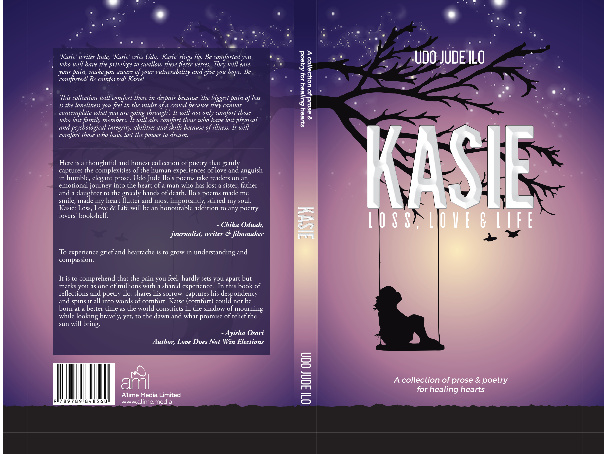BY CHIKA ODUAH
Anywhere you go in this world, it will take courage for a man to reveal his deepest sorrows. And in our Nigerian society where men are told not to cry, that crying is for women and are pressured, constantly pressured, to be “be a man,” it takes not only courage but fortitude and perhaps a spirit of fierce independence for a man in Nigeria to go against sociocultural expectations and reveal his deepest sorrows.
That is exactly what Udo Jude Ilo has done in the collection of poetry that we are all here this evening to acknowledge and to celebrate.
Kasie: Loss, Love and Life is that rare revelation of grief in a Nigerian man’s heart. And this is not fiction. We’re talking about a true story. Udo Jude Ilo put his tears on paper for us to read, and I believe that we can all be more enriched by this book of poems.
Advertisement
Here is a thoughtful and honest collection of poetry that gently captures the complexities of the human experiences of love and anguish in humble prose. The writing here is not bombastic, not peppered with a big vocabulary. No, because that is not necessary. It is a simple and meek language. Udo Jude Ilo’s poems take readers on an emotional journey into the heart of a man who has lost a sister, father, and daughter to the greedy hands of death. Ilo’s poems made me smile and they made me think. Kasie: Loss, Love & Life will be an honorable addition to any poetry lovers’ bookshelf.
The author dedicates the book to three beloved individuals who are no longer here with us in the physical realm, but whose spirit will never die. Because spirit is energy and energy never dies. These three people are: Natasha Nkemdilim, the author’s daughter who passed away when she was two years old. To the author’s father, who passed away in 2016, just four months before Natasha’s demise, and then to the author’s sister, Bibiana. She passed away in 1998, and according to the author was already in heaven to welcome Natasha and her father through the pearly gates.
You know, poetry was my first mode of creative expression. I began writing poetry when I was about eight years old and I still turn to poetry when my soul needs to be stirred. Because poetry has the power to do that, to move your soul and wrap your mind around its mysterious magic.
Advertisement
The book that we are here for tonight not only offers rich words but also heartwarming illustrations. The art in this book is simple sketches that capture moments in life.
For example, the cover page is draped in a mystical purple color, with a silhouette of a child sitting on a swing that hangs from a tree. I imagine that child to be Natasha, the little girl whose life was taken so soon. In the illustration, she is looking up at the stars. A couple of birds soar across the page.
This collection of poetry is a somber, contemplative experience. It is not joyful at all. There is no laughter here. And there is no burst of happiness. And that is OK. Life demands that we mourn at times. There is light and there is darkness. There is a pleasure and there is pain. This book is clearly about pain. The author explores his own pain. He dissects it like a surgeon, experiments with it like a scientist, analyzes it like a psychologist. He is even haunted by it. Imagine that, to be haunted by your own pain? What do you do when you cannot stop hearing the voice of your own dead daughter?
This is the kind of heavy grief that this collection of poetry confronts head-on.
Advertisement
Can everyone write such a book?
No.
And that is why we must give credit to where credit is due.
It took guts to write these poems, to articulate your suffering, and present it for the public to scrutinize, critique, and consume it.
Advertisement
The poems in this book present an array of personal reflections in several forms, including letters and prayers. The author shares questions that he poses to God. And I am reminded of one of the most famous books in the Bible. Job. The story of an upright, wealthy man who faced an incredible amount of suffering within a short time span and then turned to God in sheer agony with a series of questions. Why God? Why? What did I do? What did I not do?
Udo Jude Ilo poses these same questions. And we can all empathize with that.
Advertisement
You know, I believe that we do not talk enough about sorrowful feelings in Nigeria. We do not speak enough about our pained emotions. We suffer and smile. We swallow our pain. We tell each other to move on and we think that we have moved on from that pain in the past. But have we really?
Because if you are honest with yourself, if you look deep, deep, deep down, you may not have fully recovered from that loss you experienced some years ago. There is injustice happening in this country every single day. Injustice that defies comprehension. I am a journalist, so I see much of it firsthand. There is great hardship, suffering, and anguish in this land – from yesterday and today.
Advertisement
We have mass graves. We have torture chambers inside police stations. We have abductions. We have ritual killings. We have communal clashes that end up in massacres. We have an inept healthcare system that leaves people to die if the bill is not paid; if the doctors are on strike; or if the electricity cuts off.
And I cannot stand here and speak to you all without mentioning the parents whose children have been kidnapped in recent times. I do not have any children of my own so I may not be able to completely fathom what such a loss may feel like, but I do know it is time that we allow people to cry, even in public. Better yet in the public.
Advertisement
Allow them to cry for as long as they need to.
Many of us are hiding behind a mask that keeps on smiling, like a clown. But that is illogical. That permanent smile is inhumane. It is inauthentic.
We have a plethora of valid reasons to cry in this country, but we have told ourselves that we are the “happiest people in the world.”
What I am trying to say here is that there is purpose in mourning. There is purpose, real purpose in sorrow.
When you mourn, properly, I believe that you are actually going through a process of cleansing. Cleansing heals. Psychologists say that there are five stages of grief, some say seven but here are the basic five: They are shock and denial. Number two, anger; number three, bargaining; number four is depression and number five is acceptance.
Too often in our society, we curtail these stages. We do not allow people to pass through them. We say, “it is in God’s hands. Move on.”
But no society can truly sustain itself when people are not encouraged to fully explore their emotions. When the mental state, the psyche, is not properly cared for. When men are told that they should be men and therefore be stoic. This produces a society of emotionally stilted, or emotionally handicapped, emotionally underdeveloped citizens and in all honesty, that is what we have today in Nigeria. We fail to empathize with someone who is mourning, especially if they are from another part of the country that is not our own.
There are emotionally traumatized people walking around the streets of this country like ticking time bombs. And in many cases, those time bombs have already detonated. How else can you describe a situation where tragedy, both personal and collective, has become normalized?
In this country, it almost seems like a taboo to talk deeply about sorrow. We say that we are so blessed and highly favored. We say that we are prosperous in Jesus Name, by the grace of Allah.
And all that is good, don’t get me wrong, but some of it is pretense. We ask someone how are you and we don’t really stay around to listen to the response because we expect them to automatically say, “I’m fine.”
But what if they are not… fine? What if they spent last night crying on the kitchen floor?
Death by drowning in a swimming pool.
That is how 2-year-old Natasha died.
Drowning is one of the most painful ways to die. The lungs swell with the mighty pressure of water. Scientists say it feels like the entire body is on fire.
Like suicide, depression, sexual abuse, incest, murder, kidnappings… drowning is an ugly thing. I almost drowned once when I was a little girl… I was about 8 years old…in a swimming pool. My father was there. He is from the River Niger area so he swims like a fish. He jumped into the pool, wrapped his arm around my body and pulled me from the water.
Drowning is an ugly thing. Even nearly drowning is an ugly thing.
But we cannot shy away from talking about ugly things. The more we talk about them in the public forum, the better we can become as a nation. We need books like this, as a people. Because nation-building is also about communion building. It is about looking after your neighbor’s emotional wellbeing, being a witness to it, and not shutting him or her down when she calls you on the telephone and simply wants to cry. Allow him or her to cry.
There is a reason why the Book of Job was included in the Bible. It was put there for humankind to understand that no one in this life can escape hardship. No matter how long you fast; no matter how powerful you speak in tongues; no matter how many times in a day that you pray. All that is there to help us to better handle the hardships that will come.
The book we are here for today reveals the author’s grieving process. I was able to recognize that he went through the five stages: the way he blamed himself for his daughter’s death, the deep hopelessness, the frustration, beating himself up over and over and over again.
But there is a time for everything, right? And though weeping endures for a night, joy comes in the morning. Part two of this book is called “Love” and it begins with an illustration of a tree with leaves bursting from the branches in the shape of red hearts.
Leaves bursting in the shape of red hearts. Now, imagine what that looks like.
The review was presented on February 23, 2021, at the event launch of ‘Kasie’ and the Natasha Ilo Foundation
Add a comment






